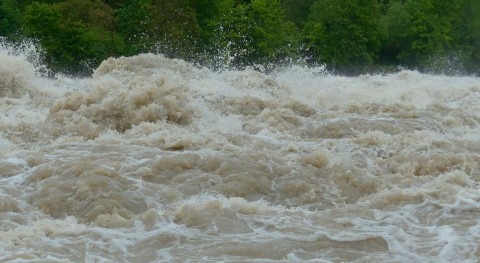We interviewed Teresa Hartmann, Project Lead for Climate Initiatives at the World Economic Forum, on the opportunities emerging in the aftermath of the pandemic.
The World Economic Forum (WEF), a Geneva-based nonprofit, has been fostering public-private cooperation since its creation in 1971. The WEF engages the foremost political, business, cultural and other leaders of society to shape global, regional and industry agendas. Always at the forefront of global issues, currently it provides strategic insight on the impact of the COVID-19 pandemic and governments’ responses to it.
Question: Green stimulus packages in response to the pandemic offer an opportunity to shape policies in line with climate action. While this may not happen immediately, what do you think are the prospects of governments seizing this opportunity?
Answer: The COVID pandemic has exposed the fragility of our current economic, social and health systems. Forward-looking governments have recognized the importance of designing stimulus plans with long-term resilience in mind.
At the same time, governments are under enormous pressure to pass recovery packages swiftly to restart the economy. The important thing is to ensure we do not create an unintended rebound effect where greenhouse gas emissions and pollution surge as a result of short-term growth.
In the EU, 13 climate and environment ministers called for a Green Deal to be an integral part of the recovery package. At the same time, however, we are seeing environmental regulation being suspended in the name of economic recovery, for example in the US.
Environmental resilience and human health are intrinsically linked. Air pollution contributes to respiratory disease, shifting climatic zones accelerate the propagation of tropical diseases like malaria and floods carry infectious diseases like typhoid and cholera.
What we are experiencing now is that pandemics can have a devastating impact on the economy. Investing in a clean transition has the potential to reverse these adverse economic effects while safeguarding nature and human health.
Fighting climate change, investing in a clean environment and resilient infrastructure today, is also an investment in public health and dynamic economies further down the road.
Investing in a clean environment and resilient infrastructure today is also an investment in public health and dynamic economies
Q: What do you think businesses can learn from the coronavirus crisis in terms of risk, resilience, and diversification to climate-proof themselves?
A: Similar to what we are seeing today, many of the climate-related crises that are yet to come have the potential to disrupt global value chains, decrease food security and threaten traditional business models.
During the pandemic, we are seeing companies that invested heavily in talent, digital transformation or customer relations are proving more agile in responding to the current situation. As climate risks increase, the ability to respond to natural disasters, supply chain disruption and shifts in agricultural production is becoming more business-critical.
In both cases, crisis preparedness requires long-term investments and a stakeholder focus rather than short-term profit maximization.
.jpg)
Q: Businesses across different sectors have been integrating green transition and digital transformation in the past years. Do you think these trends will accelerate in the aftermath of the pandemic, and will they help with climate readiness?
A: Climate readiness is the next big frontier for business to remain competitive. The world needs to prepare for more frequent natural disasters, droughts, wildfires and desertification. The ability to reduce water and energy consumption, shore up infrastructure and diversify production will determine the survival of many industries.
While the case for climate readiness is clear in the medium to long term, businesses are faced with an immediate crisis that is bound to focus resources on the current economic viability of their companies.
Governments have increasingly been incentivizing clean energy, pricing greenhouse gas emissions and pollution. The question is whether we can rely on policymakers to continue these measures rather than backslide in the face of an economic downturn.
Companies that invested in talent, digital transformation or customer relations are proving more agile in the current situation
Q: The risk of a global pandemic was known for years, yet we did not pay attention to it and are now realising the costs of such unpreparedness. Experts have made us well aware of the risks of climate change for years too. Do you think there will be a new attitude to risk that leads to heightened climate action from now on?
A: The human tragedy and economic downturn of the pandemic have cast a light on the stark inequalities in our society. Climate change is set to exacerbate the human hardship, economic inequality and global health crises. Fighting climate change seems like an obvious choice when it is a way to ensure healthy societies and economic prosperity.
However, the risks associated with climate change are often indirect and difficult to grasp or directly attribute to one country, business or individual action.
That’s what makes the psychology of climate action so complex. We need to become better at speaking a clear language. Climate change means hunger crises, a lack of clean water, mass migration and war.
We were seeing mass movements like Fridays for Future, calling for climate action before the pandemic. It remains to be seen whether these trends persist in a post-COVID economy.
We need to continue to lend a voice to youth, progressive businesses and governments. Otherwise climate action risks getting lost in the public discourse amidst fears of a recession and the second wave of the pandemic.
International platforms like the World Economic Forum and the United Nations have a crucial role to play in driving action, as do media outlets in keeping the discourse alive and citizens in holding their governments to account.
Q: The authors of the UN World Water Development Report, released on March 22nd noted that, while the need to combat climate change through better management of the water cycle is well recognized, it is not being translated into reality. Do you think there is momentum in the calls for a green recovery from the pandemic to increase the role of the water sector as a key one to ensure resilience to global threats?
A: Water availability is one of the most critical issues to ensure food security and improve human health. This is one of the tangible issues in the context of climate change that has the potential to improve the lives of millions.
While the transmission of COVID-19 was not linked to clean water, other epidemics like Ebola are. As global pandemics are becoming more frequent and climate change is outpacing us, it is imperative to improve water management.
The current momentum on the public health debate certainly enables increased investments in the sector. The water cycle is also an important feedback loop with the potential to further exacerbate climate change. Looking at environmental triggers, we could see an 8% reduction of rainfall in the Amazon by 2050, turning the world’s lungs into a savannah.
There are successful initiatives like the 2030 water resources group that address water storage, wastewater treatment, freshwater abstraction. Governments will need to increase resources to scale and amplify these efforts.
International platforms like the World Economic Forum and the United Nations have a crucial role to play in driving action
Q: Our societies are showing their ability to adapt to the new circumstances imposed by the pandemic. What do you think could be done to reinforce the idea that, the same as we have been able to successfully re-arrange our lives to practice social distancing, positive change to achieve climate action objectives is possible?
A: We are all experiencing firsthand how a radical lifestyle change can clear up polluted skies, bring back wildlife to cities and reduce traffic to almost zero. This is triggering a discussion on how to design livable cities, low-carbon economies and shared transport systems in a post-COVID world.
As our movements have become constrained, we are valuing our communities and personal relationships more, taking time to reflect on our priorities and are returning to a much simpler life with shorter distances and an externally imposed material minimalism.
During the lockdown, we’ve seen the emergence of shorter value chains, for example an increased uptake of local vegetable production and a natural tendency towards circular models, where communities are sharing, swapping or reusing equipment.
In times of reduced or slower international trade, strengthening local and regional value chains can improve economic and environmental resilience at the same time.
I would hope that this sentiment of social solidarity, the sharing economy and appreciation for “less is more” can persist beyond the pandemic.











